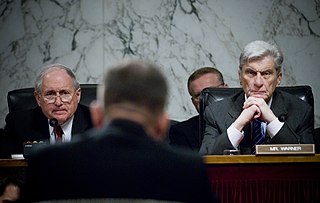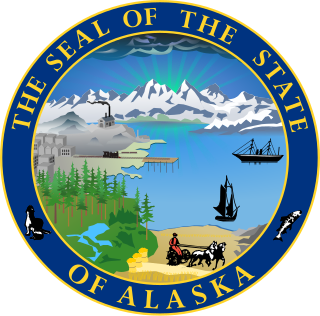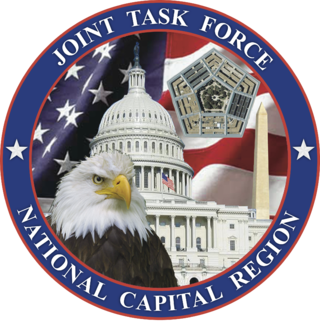Related Research Articles

The Florida Legislature is the legislature of the U.S. state of Florida. It is organized as a bicameral body composed of an upper chamber, the Senate, and a lower chamber, the House of Representatives. Article III, Section 1 of the Florida Constitution, adopted in 1968, defines the role of the legislature and how it is to be constituted. The legislature is composed of 160 state legislators. The primary purpose of the legislature is to enact new laws and amend or repeal existing laws. It meets in the Florida State Capitol building in Tallahassee.

The California State Senate is the upper house of the California State Legislature, the lower house being the California State Assembly. The state senate convenes, along with the state assembly, at the California State Capitol in Sacramento.

A congressional committee is a legislative sub-organization in the United States Congress that handles a specific duty. Committee membership enables members to develop specialized knowledge of the matters under their jurisdiction. As "little legislatures", the committees monitor ongoing governmental operations, identify issues suitable for legislative review, gather and evaluate information, and recommend courses of action to their parent body. Woodrow Wilson once wrote, "it is not far from the truth to say that Congress in session is Congress on public exhibition, whilst Congress in its committee rooms is Congress at work." It is not expected that a member of Congress be an expert on all matters and subject areas that come before Congress. Congressional committees provide valuable informational services to Congress by investigating and reporting about specialized subjects.
A congressional subcommittee in the United States Congress is a subdivision of a United States congressional committee that considers specified matters and reports back to the full committee.

The Tennessee Senate is the upper house of the U.S. state of Tennessee's state legislature, which is known formally as the Tennessee General Assembly.

The Tennessee General Assembly (TNGA) is the state legislature of the U.S. state of Tennessee. It is a part-time bicameral legislature consisting of a Senate and a House of Representatives. The Speaker of the Senate carries the additional title and office of Lieutenant Governor of Tennessee. In addition to passing a budget for state government plus other legislation, the General Assembly appoints three state officers specified by the state constitution. It is also the initiating body in any process to amend the state's constitution.

The Alaska State Senate is the upper house in the Alaska Legislature, the state legislature of the U.S. state of Alaska. It convenes in the Alaska State Capitol in Juneau, Alaska and is responsible for making laws and confirming or rejecting gubernatorial appointments to the state cabinet, commissions and boards.

The Maryland Senate, sometimes referred to as the Maryland State Senate, is the upper house of the General Assembly, the state legislature of the U.S. state of Maryland. Composed of 47 senators elected from an equal number of constituent single-member districts, the Senate is responsible, along with the Maryland House of Delegates, for passage of laws in Maryland, and for confirming executive appointments made by the Governor of Maryland.

Joint Task Force National Capital Region is an element of United States Northern Command tasked to support presidential inaugurations..

Between 73 and 79 days after the presidential election, the president-elect of the United States is inaugurated as president by taking the presidential oath of office. The inauguration takes place for each new presidential term, even if the president is continuing in office for a second term.

The Arkansas State Senate is the upper branch of the Arkansas General Assembly. The Senate consists of 35 members, each representing a district with about 83,000 people. Service in the state legislature is part-time, and many state senators have full-time jobs during the rest of the year. During the current term, the Senate contains twenty-nine Republicans and six Democrats.

The Indiana Senate is the upper house of the Indiana General Assembly, the state legislature of the U.S. state of Indiana. The Senate is composed of 50 members representing an equal number of constituent districts. Senators serve four-year terms without term limits. According to the 2010 U.S. census, the average state senator represents 129,676 people.

The Vermont Senate is the upper house of the Vermont General Assembly, the state legislature of the U.S. state of Vermont. The senate consists of 30 members elected from multi-member districts. Each senator represents at least 20,300 citizens. Senators are elected to two-year terms and there is no limit to the number of terms that a senator may serve.

The first inauguration of George Washington as the first president of the United States was held on Thursday, April 30, 1789, on the balcony of Federal Hall in New York City, New York. The inauguration was held nearly two months after the beginning of the first four-year term of George Washington as president. Chancellor of New York Robert Livingston administered the presidential oath of office. With this inauguration, the executive branch of the United States government officially began operations under the new frame of government established by the 1787 Constitution. The inauguration of John Adams as vice president was on April 21, 1789, when he assumed his duties as presiding officer of the United States Senate; this also remains the only scheduled inauguration to take place on a day that was neither January nor March.

The first inauguration of Bill Clinton as the 42nd president of the United States was held on Wednesday, January 20, 1993, at the West Front of the United States Capitol in Washington, D.C. This was the 52nd inauguration and marked the commencement of the first term of Bill Clinton as president and Al Gore as vice president. At 46 years, 154 days of age at the time of his first inauguration, Clinton was the third-youngest person to become president, and the first from the Baby Boomer generation.

The United States Senate is the upper chamber of the United States Congress. The United States Senate and the lower chamber of Congress, the United States House of Representatives, comprise the federal bicameral legislature of the United States. Together, the Senate and the House maintain authority under Article One of the U.S. Constitution to pass or defeat federal legislation. The Senate has exclusive power to confirm U.S. presidential appointments, approve or reject treaties, and try cases of impeachment brought by the House. The Senate and the House provide a check and balance on the powers of the executive and judicial branches of government.

The second inauguration of Barack Obama as the 44th president of the United States was the 57th inauguration, marking the commencement of his second and final term, with Joe Biden as vice president. A private swearing-in ceremony took place on Sunday, January 20, 2013, in the Blue Room of the White House, followed by a public inauguration ceremony on Monday, January 21, 2013, at the West Front of the United States Capitol in Washington, D.C.

The inauguration of Joe Biden as the 46th president of the United States took place on Wednesday, January 20, 2021, marking the start of the four-year term of Joe Biden as president and Kamala Harris as vice president. The 59th presidential inauguration took place on the West Front of the United States Capitol in Washington, D.C. Biden took the presidential oath of office, before which Harris took the vice presidential oath of office.
References
- ↑ "Inaugural Committees". United States Senate. Retrieved April 10, 2020.